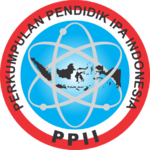IDENTIFICATION OF SCIENTIFIC ATTITUDE ON SENIOR HIGH SCHOOL STUDENTS IN SOLUBILITY AND SOLUBILITY PRODUCT CONCEPT
DOI:
https://doi.org/10.26740/jppipa.v5n1.p23-29Keywords:
Scientific attitude, guided inquiry, solubility and solubility product conceptAbstract
The main objectives of this study is to describe students' scientific attitudes on the solubility and solubility product concept before and after guided inquiry-based learning. The scientific attitude in this study includes four indicators, that is student attitudes towards science, the importance of science in life, student responses to science as a career, and student responses to learning science in school. Scientific attitudes play an important role in student decision making to develop scientific knowledge further, pursue careers in science, and use scientific concepts and methods in their lives. This study used a survey method for 40 students enrolled in the 2017/2018 academic year. Data obtained through questionnaires and observations of scientific attitudes during learning activities. The questionnaire technique consisted of a self-assessment sheet and an assessment sheet between friends, each containing 30 statements (positive and negative). This sheet was given before and after learning activities. Data were analyzed quantitatively and qualitatively according to the description. The results of scientific attitudes obtained from the self-assessment sheet and among friends are presented in Table 1. From the results of the study, it was shown that student attitudes towards science were the highest scores for the scientific aspects and there were differences in students' scientific attitudes before and after guided inquiry-based learning on the solubility and solubility product concept.
Keywords: Scientific attitude, guided inquiry, solubility and solubility product conceptReferences
Kemendikbud. 2013. Peraturan Menteri Pendidikan dan Kebudayaan Nomor 69 Tahun 2013 tentang Kerangka Dasar dan Struktur Kurikulum SMA/MA. Jakarta: Departemen Pendidikan dan Kebudayaan.
Dahar, R. W. 2011. Teori-Teori Belajar & Pembelajaran. Jakarta: Erlangga.
OECD. 2016. PISA 2015 Assessment and Analytical Framework: Science, Reading, Mathematic and Financial Literacy. Paris: OECD Publishing.
Sanjaya, W. 2013. Penelitian Pendidikan, Jenis, Metode dan Prosedur. Jakarta: Kencana Prenada Media Group.
Aulia, E. V., Poedjiastoeti, S. and Agustini, R. 2018. The Effectiveness of Guided Inquiry-Based Learning Material on Students Science Literacy Skills. Journal of Physics: Conference Series 947 012049
Aulia, E. V. 2019. Improving Science Literacy Skills for High School Students Through Guided Inquiry-Based Learning. Mathematics, Informatics, Science, and Education International Conference (MISEIC 2019) Atlantic Press.
Susiwi, S. 2007. Pendekatan Pembelajaran dalam Pembelajaran Kimia. Bandung: Jurusan Pendidikan Kimia FPMIPA UPI.
Gulo, W. 2008. Strategi Belajar Mengajar. Jakarta: PT Gramedia.
Setiowati, H., Nugroho, A. and Agustina, W. 2015. Penerapan Model Pembelajaran Inkuiri Terbimbing (Guided Inquiry) Dilengkapi LKS untuk Meningkatkan Aktivitas dan Prestasi Belajar Siswa pada Materi Pokok Kelarutan dan Hasil Kali Kelarutan Kelas XI MIA SMA Negeri 1 Banyudono Tahun Pelajaran 2014/2015 Jurnal Pendidikan Kimia (JPK) 4 pp 54-60
Ural, E. 2016. The Effect of Guided-Inquiry Laboratory Experiments on Science Education Students' Chemistry Laboratory Attitudes, Anxiety and Achievement Journal of Education and Training Studies 4 pp 217-227
Sesen, B. A. and Tarhan, L. 2013 Inquiry-Based Laboratory Activities in Electrochemistry: High School Students Achievements and Attitudes Research in Science Education 43 pp 413-435
Rakhmawan, A., Setiabudi, A. and Mudzakir, A. 2015. Perancangan Pembelajaran Literasi Sains Berbasis Inkuiri pada Kegiatan Laboratorium Jurnal Penelitian dan Pembelajaran IPA (JPPI) 1 pp 143-152
Gültepe, N. and Kiliç, Z. 2013. Scientific Argumentation and Conceptual Understanding of High School Students on Solubility Equilibrium and Acids and Bases Journal of Turkish Science Education 10 pp 5-21
Salta, K. and Tzougraki, C. 2004. Attitudes Toward Chemistry Among 11th Grade Students in High Schools in Greece Science Education 88 pp 535-547
Menis, J. 1989. Attitudes towards School, Chemistry and Science among Upper Secondary Chemistry Students in the United States Research in Science & Technological Education 7 pp 183-190
Riduwan. 2012. Skala Pengukuran Variabel-Variabel Penelitian. Bandung: Alfabeta.
Ratumanan, T. G. & Laurens, T. 2011. Penilaian Hasil Belajar pada Tingkat Satuan Pendidikan Edisi 2. Surabaya: Unesa University Press.
Downloads
Published
How to Cite
Issue
Section
 Abstract views: 475
,
Abstract views: 475
, PDF Downloads: 362
PDF Downloads: 362











